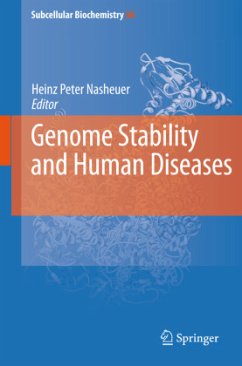
Genome Stability and Human Diseases

PAYBACK Punkte
76 °P sammeln!
Since the establishment of the DNA structure researchers have been highly interested in the molecular basis of the inheritance of genes and of genetic disorders. Scientific investigations of the last two decades have shown that, in addition to oncogenic viruses and signalling pathways alterations, genomic instability is important in the development of cancer. This view is supported by the findings that aneuploidy, which results from chromosome instability, is one of the hallmarks of cancer cells. Chromosomal instability also underpins our fundamental principles of understanding tumourigenesis:...
Since the establishment of the DNA structure researchers have been highly interested in the molecular basis of the inheritance of genes and of genetic disorders. Scientific investigations of the last two decades have shown that, in addition to oncogenic viruses and signalling pathways alterations, genomic instability is important in the development of cancer. This view is supported by the findings that aneuploidy, which results from chromosome instability, is one of the hallmarks of cancer cells. Chromosomal instability also underpins our fundamental principles of understanding tumourigenesis: It thought that cancer arises from the sequential acquisition of genetic alterations in specific genes. In this hypothesis, these rare genetic events represent rate-limiting 'bottlenecks' in the clonal evolution of a cancer, and pre-cancerous cells can evolve into neoplastic cells through the acquisition of somatic mutations.
This book is written by international leading scientists in the field of genome stability. Chapters are devoted to genome stability and anti-cancer drug targets, histone modifications, chromatin factors, DNA repair, apoptosis and many other key areas of research. The chapters give insights into the newest development of the genome stability and human diseases and bring the current understanding of the mechanisms leading to chromosome instability and their potential for clinical impact to the reader.
This book is written by international leading scientists in the field of genome stability. Chapters are devoted to genome stability and anti-cancer drug targets, histone modifications, chromatin factors, DNA repair, apoptosis and many other key areas of research. The chapters give insights into the newest development of the genome stability and human diseases and bring the current understanding of the mechanisms leading to chromosome instability and their potential for clinical impact to the reader.














